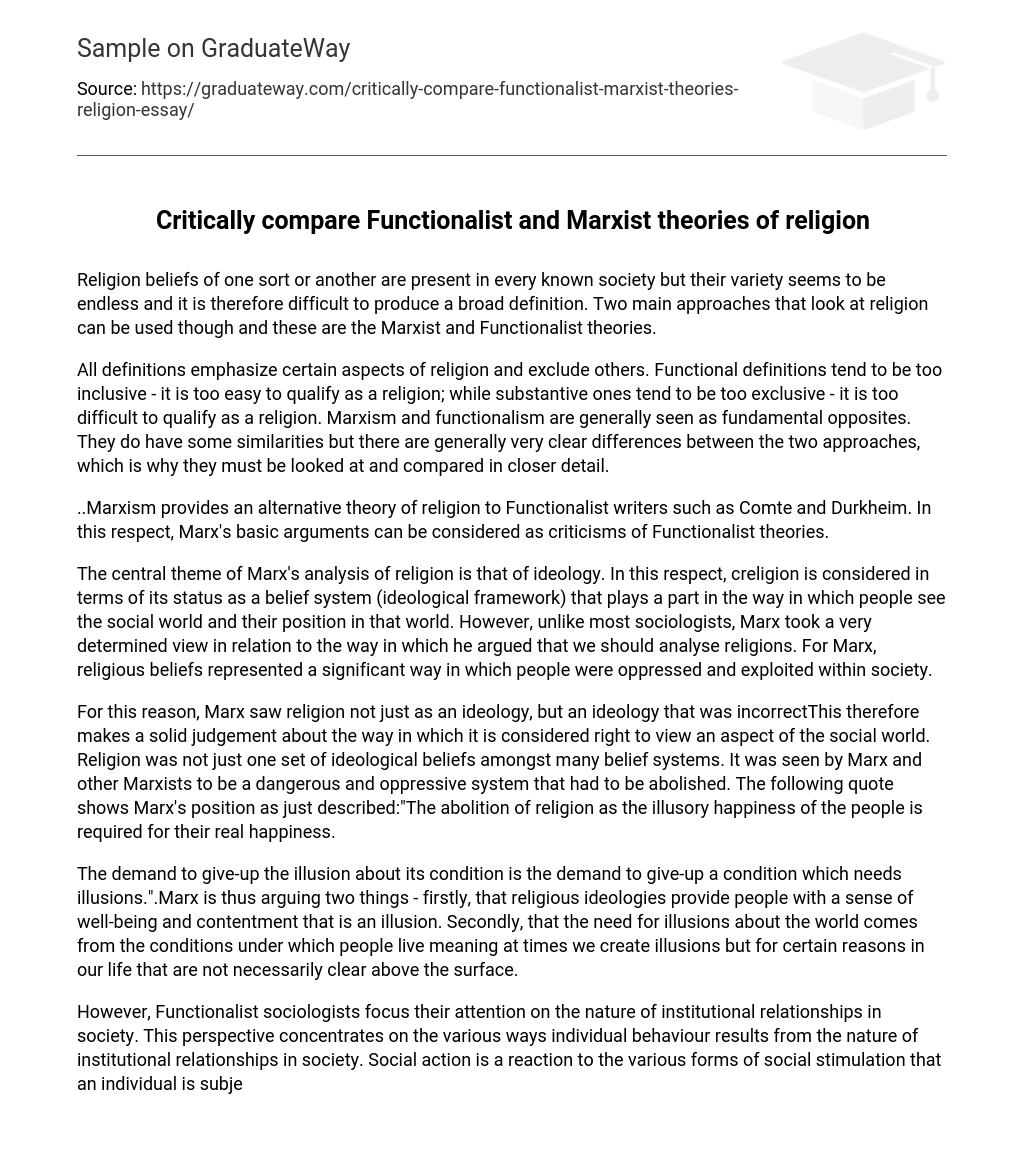Religion beliefs of one sort or another are present in every known society but their variety seems to be endless and it is therefore difficult to produce a broad definition. Two main approaches that look at religion can be used though and these are the Marxist and Functionalist theories.
All definitions emphasize certain aspects of religion and exclude others. Functional definitions tend to be too inclusive – it is too easy to qualify as a religion; while substantive ones tend to be too exclusive – it is too difficult to qualify as a religion. Marxism and functionalism are generally seen as fundamental opposites. They do have some similarities but there are generally very clear differences between the two approaches, which is why they must be looked at and compared in closer detail.
..Marxism provides an alternative theory of religion to Functionalist writers such as Comte and Durkheim. In this respect, Marx’s basic arguments can be considered as criticisms of Functionalist theories.
The central theme of Marx’s analysis of religion is that of ideology. In this respect, creligion is considered in terms of its status as a belief system (ideological framework) that plays a part in the way in which people see the social world and their position in that world. However, unlike most sociologists, Marx took a very determined view in relation to the way in which he argued that we should analyse religions. For Marx, religious beliefs represented a significant way in which people were oppressed and exploited within society.
For this reason, Marx saw religion not just as an ideology, but an ideology that was incorrectThis therefore makes a solid judgement about the way in which it is considered right to view an aspect of the social world. Religion was not just one set of ideological beliefs amongst many belief systems. It was seen by Marx and other Marxists to be a dangerous and oppressive system that had to be abolished. The following quote shows Marx’s position as just described:”The abolition of religion as the illusory happiness of the people is required for their real happiness.
The demand to give-up the illusion about its condition is the demand to give-up a condition which needs illusions.”.Marx is thus arguing two things – firstly, that religious ideologies provide people with a sense of well-being and contentment that is an illusion. Secondly, that the need for illusions about the world comes from the conditions under which people live meaning at times we create illusions but for certain reasons in our life that are not necessarily clear above the surface.
However, Functionalist sociologists focus their attention on the nature of institutional relationships in society. This perspective concentrates on the various ways individual behaviour results from the nature of institutional relationships in society. Social action is a reaction to the various forms of social stimulation that an individual is subjected to as part of the process of living in a certain society.According to Parsons, for example, all institutions in society (family, work, education, religion etc) have a particular set of functions.
Durkheim was one of the first Functionalist sociologists to write at length about the role of religion in society. The reference to the “elementary forms” of religious life means a concern with the basic, fundamental, aspects of all forms of religion and it is here that we find the basis for Durkheim’s analysis and understanding of the development and role of religion in any society.For Durkheim, any analysis of the role of religious practice had to be done in terms of the social purpose or function of religious activity (the analysis of what religion does for the individual and society). In this respect, he was concerned with understanding religion in terms of the way it served an integrating function in any society, rather than with an analysis of specific differences in religious practice.
Thus, in the above respect, whilst we might expect to see a decline in the importance of religion as an aspect of modern societies, religious beliefs, values and ideologies will persist because religion is such a flexible, adaptable framework for the explanation of “certain things in our everyday lives.In some ways though, it can be argued that both theories have weak areas. For example, they both similarly fail to consider secularization. The ideological power of religion is undermines by the fact that less than 10% of people attend church.
Either way, the comparisons are clear through such sociologists work as Durkheim, Malinowski and Marx, and can easily be concluded despite some similarities like the example above. The functionalist perspective examines religion in terms of society’s needs and that the function of religion is the contribution it makes to meeting such functional prerequisites. Yet, Marxism tells us that religion is an illusion which eases the pain produced by exploitation and oppression and is a distortion or reality.





